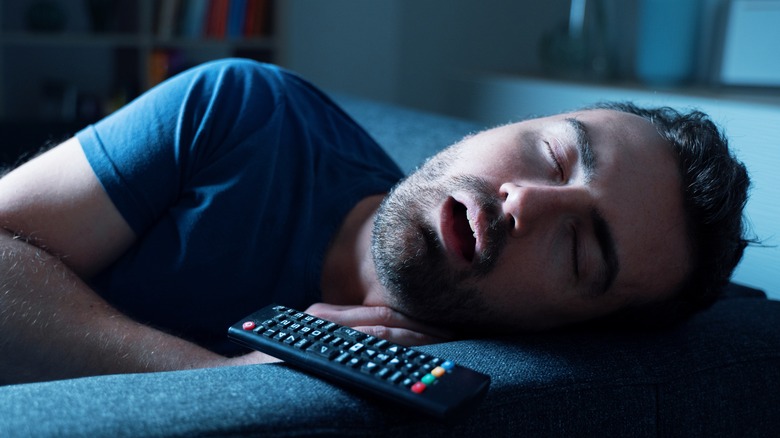Why You May Want To Think Twice About Sleeping With The TV On At Night
There are some who grew up with a nightlight in the corner of the room, or maybe you're a parent now, dozing off with rain sounds playing in the background to help your little one stay calm during the night. The truth is, there are loads of gadgets that claim to help you sleep better through the night. These are just some of the more common comforts people rely on during the night, and among them, is sleeping with the TV on. The constant noise could help to drown out a noisy neighborhood, or quite the opposite, it could help to distract your mind from thinking too much in an eerily silent bedroom.
Whether you fall into the trap of sleeping with the TV on every night, or only occasionally slip off into a sleep while the TV still plays, it's worth knowing the pros and cons of doing so. For the most part, the negatives are pretty obvious. Keeping an electrical appliance running throughout the night is going to cost you, and it might be harming your quality of sleep, too. This is especially true if you forget to turn the volume down, and loud adverts keep jolting you awake. There are economic and biological drawbacks.
Here's how much your TV costs you during the night
While it won't necessarily break the bank, keeping your TV switched on throughout the night will have a financial cost, and staying on top of small expenditures is always wise. Even if you don't mind paying for the comfort of a TV playing at night, you should at least be aware of how much it's costing you. Perch Energy sports a useful calculator that shows just how much your TV is costing you per hour.
Using its recommended charge of 16 cents per kWh — which it reports to be the national average — and selecting a TV between 49 and 59 inches, with a power rating of 74 watts, you end up with a total of $2.84 per month. That's based on eight hours of constant running, a good night's sleep, so the cost is even higher when you run the TV during the day, as well.
If you'd like to save on that cost, you could always consider setting a timer, which turns your TV off after a certain amount of time. This is something you can also set up using the Netflix smartphone app. Setting your TV to play for just one hour instead of eight will reduce the cost by $2.52 per month, based on the aforementioned variables.
How else is your TV affecting you at night?
Sleeping with the TV on isn't just a drain on your wallet. According to experts (via Healthline), keeping the TV on while you're asleep could have some very real effects on your health. For example, it may be increasing your sleep debt, decreasing your melatonin production, and contributing to issues, such as high blood pressure and memory loss by reducing the overall quality of your night's rest. If you can falls asleep without it, it's certainly best to, is the expert advice.
TVs also have a limited lifespan, and while it's pretty lengthy for your average modern LED TV — between 40,000 and 60,000 hours — you are nevertheless decreasing this lifespan by keeping it on throughout the night. Decreasing the brightness or keeping it in Energy Saving mode are a couple methods to prolong its life. Plasma and LCD screens have a shorter lifespan, so it's worth factoring in which kind of TV you have when weighing up whether to keep it on at night or not.


